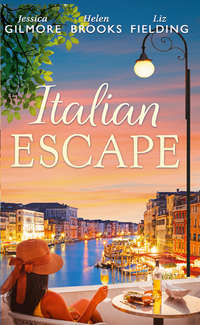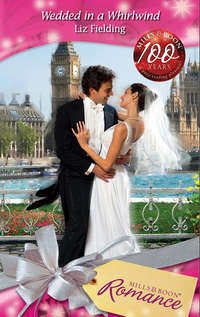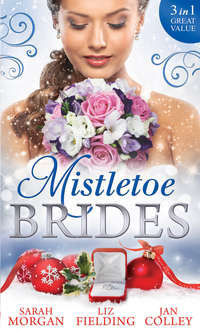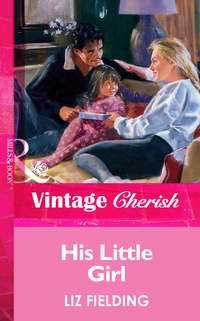
Полная версия
The Marriage Merger
Round one to her, then.
His presence ignored, he opened his briefcase and extracted a brand-new hard-back book. Ashanti Gold, by Flora Claibourne.
He, too, began to read.
Flora didn’t miss his attempt to flatter, although why he would bother at all surprised her. Not that it mattered, because she wasn’t impressed. She’d seen all the moves before.
He pushed long, elegant fingers through his shaggy mane of sun-streaked hair, taking it back from his forehead in an unconsciously graceful gesture.
That one was a classic, she thought. And beautifully done, with not a hint of the self-conscious. He made it look like a gesture he’d used all his life—not one he’d practised in front of a mirror.
She still wasn’t impressed. Bram Gifford might consider himself a world-class charmer, but it would take more than the purchase of her book, a faux interest in her subject, to turn her head. But she didn’t say anything.
While he was pretending fascination with the history and uses of gold in West Africa he wasn’t attempting to engage her in conversation, which was just fine with her.
With any luck he’d read all the way to Saraminda.
Saraminda. The name had an exotic ring to it and the island didn’t disappoint, Flora decided, as the small inter-island plane banked steeply to line up with the floor of a tropical valley, offering them a breathtaking view of the mountainous landscape.
The lower slopes were farmed on terraces painstakingly cut into the hills, but above the farms the foothills rose in wave after wave, until they soared into peaks densely thicketed with the dark green vegetation of a rainforest that until recently had hidden the ruins of a temple where a young woman had been buried with all the ceremony of a queen.
Allegedly.
She’d met Tipi Myan briefly at a reception given by the travel department at the store more than a year ago. He hadn’t been Minister of Antiquities then. He’d been running the country’s tourist authority.
Call her cynical, but if she’d been in his shoes she might have been tempted to use that very tenuous acquaintance to ask the author of Ashanti Gold to write about his “lost princess”. It would provoke a lot more interest in his island than an article by some jobbing photo-journalist looking for a story to sell.
It had been his good fortune that she’d been looking for an escape route at the time. One that had backfired on her. As Bram Gifford leaned across her to get a better look, his thick corn-coloured hair catching the sun, the small inner voice that warned her she was being used, grew louder.
She was being used by everyone. All that had changed was her ability to see the game for what it was and ensure that she wasn’t hurt in the process.
‘We’re going up there?’ Bram asked, looking up at mountain peaks gold-misted in the dawn light before turning to her. He was, she thought, heart-meltingly handsome, with warm, toffee-brown eyes that crinkled at the corners when he smiled. ‘You aren’t bothered about snakes and spiders and creepy-crawlies?’
For pity’s sake! Did she look like a bird-witted fool? Patronising cancelled out toffee-brown eyes—however crinkly their corners—every time.
‘In my experience they have more reason to be scared of me than I have of them,’ she replied matter-of-factly. She’d witnessed the most practised flirts at work, but she’d only been caught once. She was a quick learner, and it would take a lot more than ‘Me Tarzan, you Jane’ to impress her. ‘There are far more unpleasant things in this world than arthropoda,’ she added.
Bram, who’d expected the usual shiver of horror, gave a mental nod in her direction. Not too many women of his acquaintance would have resisted the opportunity to squeal a little, just to boost his ‘big strong man’ quotient. Or used arthropoda in a sentence. But then he was the first to admit that he wasn’t interested in their IQ.
Having neatly put him down, she wasn’t waiting for him to compliment her on her backbone either. He was getting the message, loud and clear, that she didn’t care what he thought.
Instead she began gathering her personal possessions without any fuss, not taking the slightest bit of notice of him.
In his experience this was usually a calculated ploy. Not noticing men had been raised to an art form by a certain type of woman. The kind who wanted to be noticed.
He had to concede that she didn’t appear to be one of them, but he’d reserve judgement.
Right now the early-morning sun, pouring in through the window, was lighting up her tortured hair and glinting off a dozen hairpins. Someone should do her a favour and throw them away, he thought. And those damned combs that she was forever replacing without seeming to notice what she was doing. As if reading his mind, she raised her hands to capture a loose strand of hair and anchor it in place.
Then, as if sensing him watching her, she let her hands drop to her lap. ‘I’m so sorry, I wasn’t thinking. That’s so remiss of me. Are you concerned for your own safety, Mr Gifford?’
This was the nearest they’d come to a conversation in the endless hours of flying. She was still sticking to his surname though, despite his request that she call him Bram. But at least it was a question: a mocking one, to be sure, but one that required an answer. A decided advance on the monosyllabic responses she’d stuck to throughout the long flight.
Clearly a seasoned traveller, she’d eaten little, refused anything but water to drink and slept without fuss when she wasn’t working—although that hadn’t been often. And while they’d waited for their transfer to the Saraminda flight at Singapore she’d toured the shops, looking at everything but buying nothing. And saying even less.
He’d used the time when she’d been sleeping to take a long hard look at Flora Claibourne. She might be clever, but she was a woman, and they all had their weak spots. If he was going to get her to open up to him, trust him, confide in him, he’d have to discover hers.
Of the three Claibourne sisters she most favoured her father in looks. Not much of a start for a girl. On her, the nose only just missed being a disaster. But then all her features were larger than life. She had a full, generous mouth that might have been dangerous if she’d bothered to make the most of it. And eyes that, although a rather undistinguished shade of brown, were strikingly framed by long lashes and fine brows.
It was a face full of character, he decided. Then had recalled his formidable grandmother ticking him off when, as a callow youth, he’d rather unkindly dismissed some girl as plain. ‘Her face may not be pretty, but it has character, Bram,’ she’d told him. ‘And she has lovely skin. That will last long after chocolate-box prettiness has lost its charm.’
He hadn’t been convinced at the time. Still wasn’t. But he had to admit that Flora Claibourne had lovely skin too. In the clear, unforgiving light at thirty thousand feet it had seemed almost translucent, with just the faintest dusting of freckles that had been invisible in the grey London morning they’d left behind them. The kind of skin that without sun block would frazzle to a red, peeling crisp. He hoped she didn’t take her reverse vanity that far.
He’d noticed, too, that asleep she lost the wary look that she disguised well beneath a faintly aggressive attitude. So what, exactly, was she wary of? Him? He hadn’t done anything to warrant wariness. Yet.
Awake, she’d concentrated on work, and he’d known better than to push his company on her. Instead he’d read her book from cover to cover, which was why he now knew more than he’d ever wanted to know about the history of gold working in West Africa. That wasn’t a complaint. She had a lively style and could tell a story. It was just that he hadn’t anticipated reading it all in one go.
To sum up, then, she was aggressively dowdy, wary and clever. In short, everything he disliked in a woman.
She was also, having ignored his presence for most of the flight, now taking the opportunity to poke a little fun at him. She might not have the style of her sisters, but he was beginning to suspect that she wasn’t going to be the push-over he’d anticipated.
A flicker of anticipation rippled through him. An unexpected charge of excitement. It was a long time since the outcome of the chase had seemed so uncertain. Or the stakes so high.
CHAPTER TWO
‘WELL?’ she prompted, still waiting for his answer. ‘Are you scared?’
‘Of spiders? Absolutely terrified of the little beggars,’ he said, the long pause lending authenticity to his apparently reluctant confession. Acknowledging a weakness had, in his experience, never failed to bring out that innate protective instinct that was the birthright of every woman.
Why spoil such a perfect opportunity to evoke her sympathy by telling the truth?
Flora regarded him levelly for a moment, as if deciding whether or not to believe him. Then she said, ‘The plane has come to a stop, Mr Gifford.’ He still didn’t know what she thought. About anything. It was disconcerting, to say the least, and he turned away to peer out of the opposite window at quaint wooden airport buildings that were smothered with flowering climbers.
‘I do believe you’re right, Miss Claibourne,’ he replied, getting to his feet to retrieve their bags and jackets from the overhead locker.
There was a bump as the door was opened and the aircraft was flooded with soft warm air, the smell of aircraft fuel mingling with the scent of the tropics. Musty, spicy, different.
‘This certainly beats London on a grey day in May,’ he said as they walked across the tarmac towards the terminal building.
‘There are no snakes in London,’ she said, automatically rescuing a comb and tucking it back in place. ‘Outside of the zoo. Or poisonous spiders.’ She knew he’d been lying. Or at least suspected as much.
‘There’s always a downside. You can’t have everything.’
‘No, you can’t, Mr Gifford.’ The customs officer waved them through with a smile. ‘You, for instance, can’t have Claibourne’s.’
Taken by surprise at her unexpected mention of the dispute, he was still groping for an appropriate answer when a short slender man, formally attired in a long silk high-necked jacket and a traditional sarong that covered him to his ankles, approached Flora and bowed politely before extending his hand.
‘Miss Claibourne! What a pleasure to meet you again. And how kind of you to come so far to write about our small treasure.’
‘Not at all, Dr Myan. I’d seen reports in the press and I’m excited at the prospect of seeing what you’ve found for myself. May I introduce my colleague, Bram Gifford?’
‘Mr Gifford.’ He covered his surprise with a small bow. ‘Are you an expert in the same field as Miss Claibourne?’
‘No,’ he said. ‘By “colleague” Miss Claibourne was referring to other interests we have in common.’
‘Oh?’ Then, with a bland look that didn’t entirely hide a touch of pique, he drew his own conclusion as to what that might be. ‘Oh, I see. Well, I’m sure you’ll enjoy your stay, Mr Gifford. Maybe we can arrange some excursions for you while Miss Claibourne is working,’ he added. ‘Saraminda is a lovely country. Wonderfully peaceful,’ he stressed.
‘Peace and love. I’m all for it,’ he said.
The flash of annoyance that had crossed Flora’s face at the man’s unspoken assumption that ‘colleague’ in this instance meant ‘lover’—and his implicit response—was the first unconsidered reaction he’d got from her. He didn’t give her a chance to clarify the situation.
‘But I’ll give the excursions a miss, thanks all the same. I’ll be sticking close to Flora.’ A man would hardly call his ‘colleague’ Miss Claibourne, now, would he? ‘Whatever she does.’
Dr Myan said nothing, but his silence was eloquent. Did he fancy her himself? Bram wondered as he turned away and ushered Flora in the direction of a long black car with official numberplates, leaving him to follow in their wake with the porter.
It seemed unlikely. She was six inches taller and didn’t dress to turn heads. Maybe it was her mind he admired. Or maybe he’d expected her undivided attention and was peeved that she wasn’t quite as single-mindedly interested in his affairs as he’d hoped.
If that was the case, the ride in from the airport should have reassured him. She spent the journey bombarding the man with questions about the items that had been found—keen to know when she could go up into the mountains to visit the site where they had been excavated, eager to take photographs for the article she was writing.
‘You wish to see the tomb?’ he enquired. ‘But why? There’s nothing there.’
‘Even so, I think I should see it.’
‘It’s a difficult journey, Miss Claibourne. Hard even for a man,’ he said, which Bram thought was probably a mistake. ‘A long walk up into the mountains. Besides, it isn’t necessary,’ he reiterated. ‘The treasure is all at the museum.’
‘But you asked if I wanted to see it,’ she reminded him. ‘And I do need to look at the excavations, perhaps link decoration of the tomb with the designs of the jewellery.’
‘I’m sorry.’ His expression was that of deep regret. ‘It is not possible.’
‘Not possible?’ she asked. ‘Why?’
Maybe Saramindan women didn’t ask questions. Dr Myan clearly assumed his word would be sufficient. He wasn’t prepared to offer explanations and for a moment floundered. ‘The tremor…there was more damage than we first thought. We cannot take the risk,’ he said, like a man clutching at passing straws.
‘Are you taking steps to stabilise the structure?’ Bram asked.
‘Plans are being made. Engineers are being consulted,’ he said carefully, as if weighing every word before uttering it. Flora glared at him for giving Tipi Myan a chance to evade her persistent questions. ‘And we will restore everything so that visitors will see it as it should be seen. When it’s safe. We are already making plans to build a lodge nearby for visitors, in traditional style, so that when they have seen the tomb they will be able to enjoy the ambience of a tropical forest in complete comfort.’
‘If the climb up there doesn’t kill them,’ Flora muttered.
‘You’re going for the eco-tourist market?’ Bram asked.
‘We have many beautiful flowers, butterflies—’
Flora had had enough. ‘That is very interesting, Dr Myan, but I must have photographs of the tomb for my article,’ she persisted.
Bram reached out and took her hand to distract her. She turned to him with a frown. He said nothing, but she got the message just the same. She wasn’t going to get anywhere by pestering Dr Myan. She retrieved her hand without fuss and let the subject drop.
‘Ah, we have arrived.’ And, having delivered them safely to a new luxury resort complex, the man excused himself with almost indecent haste, claiming an urgent appointment. ‘I will return after the holiday. Rest, enjoy yourselves. This is a charming resort.’
‘Holiday? What holiday?’
‘It is a religious feast day tomorrow.’
‘Holiday,’ she repeated with disgust, when he’d gone. ‘I’ve flown halfway round the world to see a tomb that is apparently out of bounds and now I’m told to sit and twiddle my thumbs while everything stops for a holiday. What on earth am I going to do tomorrow?’ she demanded.
Bram could think of a dozen things. However, since she was clearly outraged at having travelled so far to the see all the riches of Saraminda only to be kept waiting, he thought it wiser not to suggest sun-bathing or sightseeing as an alternative.
Instead he dealt with the formalities at Reception before they were led through the gardens to a traditional bungalow set in a garden that ran down to the beach.
Built of local timber and beautifully thatched, with a wide veranda facing the sea to catch the breeze, the single-storey, self-contained cottage offered the perfect image of a tropical holiday paradise.
He hadn’t realised an academic author warranted such red carpet treatment. Of course it was just possible that the tourist authority wanted Flora Claibourne to see what was on offer, hoping she’d go home and tell her equally wealthy friends.
They were, he thought, doomed to disappointment. Beyond a request that the air conditioner be turned off, Flora appeared as oblivious to her surroundings as she was to her appearance. She was far more interested in the photographs that Tipi Myan had left with her—none of them of the tomb—than in the simple luxury of their accommodation.
Of course it was always possible that Claibourne & Farraday had booked the accommodation when they’d organised his ticket. Maybe that was why they had one of the larger bungalows with two bedrooms, since the Minister of Antiquities had quite obviously not been expecting him. Hadn’t been particularly pleased to see him. Maybe Dr Myan thought he’d distract the lady from her work.
He needn’t have worried. Bram thought he’d never seen anyone so focused.
‘Breakfast, Flora?’ he prompted, when she didn’t seem to hear the hotel porter’s question.
She frowned at him, irritated by the interruption or perhaps by the use of her name. ‘What?’ Then, registering his question, ‘Oh, no.’ She found a smile for the young man waiting anxiously to please her. ‘Just some tea. Thank you,’ she said, before returning to the photographs.
It had been the interruption, then. Pity. For a minute there he’d thought he’d got her attention. Apparently that was reserved for hammered gold. Very old hammered gold.
He picked up one of the large glossy prints, a photograph of a small, exquisitely chased cup. ‘Is this what all the fuss is about?’
‘It’s not a fuss.’ She took the photograph away from him, looked at it for a moment. ‘If the finds are genuine…’ She trailed off, distracted by a detail.
‘If?’ he prompted. She seemed taken aback by his question. ‘You said If the finds are genuine…’
‘Did I? I must be more careful not to do my thinking out loud. Dr Myan would be deeply offended at any suggestion of doubt.’
‘But?’
She looked again at the photograph before returning it to the pile. ‘But I wouldn’t commit myself on the strength of some photographs. No matter how good. And not without seeing the site of the excavation.’
‘Why would you need to see it? You’re an expert in jewellery, not archaeology.’
‘They want my name on an article in a leading British newspaper. For that I need more than pretty pictures of treasure. I need background.’ She did some business with her hair, combing up loose strands and tucking them out of the way, then, ‘You stopped me from pushing that. Why?’
The combs were a prop, he realised with a belated flash of insight. She used them as a defence mechanism, lifting her arms to fiddle with them, putting a barrier between them, cutting off eye contact. As if embarrassed that she’d questioned him so directly.
She wasn’t anywhere near as cool as she would have him believe. In fact she was as nervous as a kitten.
Of him?
He’d done nothing to provoke such a reaction.
‘The subject appeared to make him uncomfortable,’ he said at last.
‘I wonder why?’
For a moment it seemed that they were both having the same thought. That Dr Myan had something to hide. Then she retreated from their silent complicity, returning to the photographs like a snail ducking into its shell.
‘I just can’t believe I’m going to have to waste two days before I get a chance to look at this for myself,’ she declared, with sufficient vigour to suggest her nervousness had nothing to do with him. But he suspended judgement. Flora Claibourne was a lot more complex than he’d expected.
‘It doesn’t have to be a waste of time,’ he pointed out. ‘I’m sure there’s more to the island than a mysterious tomb. That beach looks inviting, for a start. I hope you packed a swimsuit along with your walking boots.’
She looked up at him, then turned quickly away to look out across the garden. ‘It never occurred to me,’ she said. ‘But don’t let me stop you enjoying yourself.’ She opened her laptop, switched it on and plugged it into a telephone point.
About to suggest that she’d be wiser putting her feet up, taking a nap, he thought better of it. Patronising her was not going to make him Mr Popularity, and so, leaving her to it, he went in search of his bag. It was set alongside Flora’s in a large, airy bedroom with a steeply pitched raftered ceiling.
There was a total absence of clutter that he found pleasing. Just acres of dark, polished wooden floor broken only by blue and gold native rugs. There was nothing else to distract from the four-poster bed. Draped in sheer creamy cloth that stirred in the faint breeze, it was very picturesque. Very inviting.
Somehow he didn’t think Flora would be amenable to taking his declared intention to stick close to her ‘…whatever she did…’ that literally, no matter what Dr Myan might be thinking. Retrieving his bag, he moved on to the next room, which was almost identical, with a luxurious bathroom and a large walk-in wardrobe. All it lacked was a warm and eager woman to share the long tropical nights with him.
What he’d got was Flora.
It was just as well that enjoyment was the last thing on his mind right now. He felt as if he’d been travelling for ever. He wanted a shower and then he wanted to sleep. That bed looked mighty inviting.
But he knew that beating jet lag was best served by keeping local hours, and so, virtuously ignoring the siren lure of clean white linen, he took a long, cool, wake-up shower.
Flora tapped in the password to her laptop, her eyes more interested in the back view of Bram Gifford disappearing in the direction of the bedrooms.
What on earth was the man playing at? Okay, the Claibourne & Farraday thing wasn’t anyone’s business but their own, but he’d as good as implied that they were lovers. Tipi Myan had certainly thought so.
What had she been playing at, doing nothing to correct that impression?
She rubbed her hands over her face in an attempt to keep herself awake. At the time it had seemed too complicated to explain—at least that was what she’d told herself. Too complicated and none of Tipi Myan’s business.
She frowned. Despite the man’s fawning welcome, it was clear that something had happened since she’d spoken to him on the phone and agreed to write the article.
She found herself clenching the hand that Bram had taken in silent warning, reliving the moment when their minds had had but one single thought. It had made them—for a heartbeat—partners, allies, on the same side against the world.
She rubbed her palm over her fist, as if to eradicate the memory of his touch. It had been too familiar. Everything about him was too familiar. As was her reaction to him. But then women always fell in love with the same man, over and over again. They never learned, so it was said.
Perhaps she was smarter than most women. Or maybe her lesson had been harder taught. Because she’d put up her defences and now neither her famous name nor her money was sufficient inducement to tempt a man to look in her direction twice. And, if he did, it simply proved he had ulterior motives. A lose-lose situation for any man who bothered.
Bram Gifford was different, though. He didn’t want her money: he had more than enough to last several lifetimes. Nor did he seek the cachet of her famous name. He had his own, right there between the Bram and the Gifford. He was a Farraday to his fingertips.
He only wanted one thing from her. To discover her weaknesses and use them against her and her family.
With her mind quite straight on that point, she reached for her keyboard, setting the search engine to hunt for any reference to Saraminda, hoping to find some clue as to what on earth was going on.
Bram felt almost human. All he needed was coffee and food and he’d make it through the day.
Probably.
He dressed quickly in a pair of comfortable shorts and a faded T-shirt that had been washed duster-soft. Then he padded barefoot out onto the veranda and stretched out on a cane armchair, where the waiter found him when he brought him a light breakfast.









